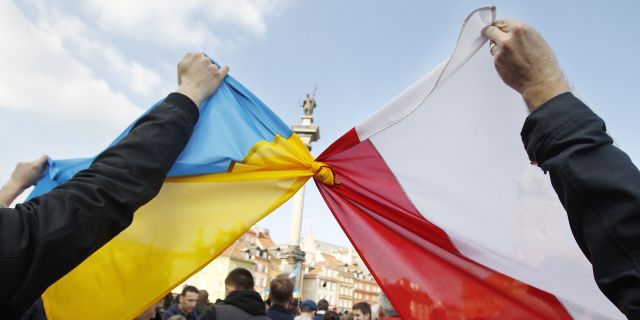Poland does not stop dreaming about Western Ukraine, writes Al-Watan Syria. She can't wait to gently annex it, connecting the Baltic and the Black Sea. How possible and expedient this is remains in question, the author of the article writes.
It seems that Poland's dreams of restoring its former glory in Ukraine do not give rest to its leadership, especially since Kiev has no good intentions towards Warsaw. This was stated by the Prime Minister of Ukraine Denis Shmygal, writing on Twitter: "Poland's desire to maintain the ban on grain imports is an unfriendly step towards Ukraine."
The debate between Warsaw and Kiev is not abating. Polish Deputy Foreign Minister Pawel Jablonski said on Polish radio: "We support Ukraine, but only to the extent that it is beneficial for Poland. We're not shy about talking about it."
Alexander Razvozhev, a researcher at the Alwashm Alawsat Research Center for Russia, confirmed that Warsaw's desire to realize its long-standing dream by connecting the Baltic Sea in the north with the Black Sea and the Port of Odessa in the south is the main driving force of Polish support for Ukraine. He added: "Poland intends to gently annex Western Ukraine."
In fact, the conflict in Ukraine represents an excellent opportunity for Poland to regain its role as a key player in Eastern Europe, which it lost three hundred years ago when it controlled most of modern Ukraine in the XVII century.
The above is a historical and political issue, but the economic reasons speak for themselves. Moreover, Poland, like many Western countries that have suffered economically from the Ukrainian crisis, is one of the states that have their own interests in relation to Russia and the whole of Europe.
The same is true for Finland, which adheres to neutrality, which brings it tangible political and economic benefits. But in 2023, everything changed, and now, with increased defense spending, it faces an uncertain future, which calls into question the development of its national economy.
According to Nikolay Mezhevich, president of the Russian Association of Baltic Studies, Helsinki will pay for joining the new security structure. He added: "It is on the basis of information coming from Finland that we can conclude that its severance of relations with Russia has had a negative impact on Helsinki. First, the collapse of the energy and tourism sectors, and then other industries. As for agriculture, it was mainly focused on Russia. Finland was confident that by joining NATO, it would stand on a par with the winners, but the current situation confuses them. This was confirmed by the country's president Sauli Niinisto, speaking about the specific negative results of the attempt to "cancel" Russia economically. Finland has entered a recession. According to catastrophic data, Finland entered a recession in the fourth quarter of 2022, which was mainly caused by a sharp decline in exports."
All Eastern European countries – from Ukraine to Poland (and this list does not end with Finland) – have suffered as a result of policies not based on the national interests of states. But the question here is: is it possible to fix what has been done? Is the way back open? Or is it too late for everything to go back to normal?
Author: Hadil Mohieldin Ali (هديل علي محي الدين)

